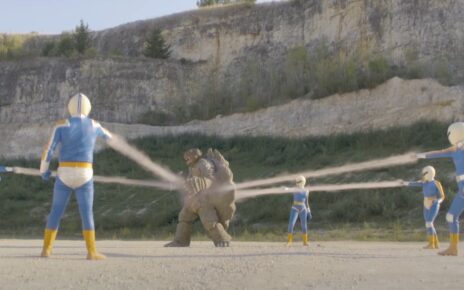Early in the morning of March 3, 1991, a high-speed chase led to the arrest of SoCal resident Rodney King. That doesn’t begin to describe what actually happened. Before being arrested, finally, King was forced onto the ground and in a police tactic entitled “swarm,” multiple armed officers repeatedly beat and kicked the prone and weaponless King. Reports showed 33 separate baton connections and seven kicks landed on the whole of King’s body before the officers finally ceased their pre-arrest foreplay.
All of it was caught on tape.
As would be mentioned several times between 3/3/91 and 4/29/92 (the conclusion of the trial for the police officers involved), this was hardly the first time LAPD had been accused of excessive force and brutality; it was simply the first time it had been caught on tape. Residents of black neighborhoods in El Lay know exactly what I’m talking about.
And, let me be clear here – while the political slogan “WE WON’T GO BACK!” was born of bodily autonomy for women, what I’ve described above is among the things no Harris voter wants to go back to.
Today’s film is set in inner-city Los Angeles on April 29, 1992, the first big day in the failure of modern American justice. When the verdict went down exonerating the offending police officers, the Los Angeles neighborhoods of Compton and Watts went ballistic; chaos, violence, and vandalism reigned. And 1992 captured the vibe perfectly.
Mercer (Tyrese Gibson) is just a father trying to get back a relationship with his son. Known locally for effective use of small-scale violence, Mercer is out on parole, has a steady maintenance job at Pluton Metals, and a small Compton residence he shares with his rebellious teenage son.
Meanwhile, in another film, Riggin Bigby (really?) is a small-time thief and son of a small-time thief, Lowell (Ray Liotta). Riggen (Scott Eastwood) IDs Pluton Metals as potential score, as the warehouse floor room contains a safe holding $10 M in platinum.
Where does one fence platinum? Never mind.
Riggen feeds the idea to his father, who rejects it, calling the warehouse “Fort Knox.” Can’t say I’d go that far, I mean it’s a warehouse, and they keep the safe largely unguarded in the middle of the floor. I mean, yeah, barbed wire, security doors, and cameras should deter most thieves, but … Fort Knox? OK, boomer.
When the verdict is announced, riots break out, and several things happen quickly in succession: Pluton Metals sends all their employees home save one security guard. Team Riggen n otices the lack of police responsiveness and decides the job is not only do-able, but needs to be done now. And Mercer decides he and his son are safer within Pluton Metals than in Compton, which may or may not be true.
otices the lack of police responsiveness and decides the job is not only do-able, but needs to be done now. And Mercer decides he and his son are safer within Pluton Metals than in Compton, which may or may not be true.
So you see the set-up here: Good guys and bad guys descending on a location where there is $10M to steal and no police presence. And it’s possible the good guys are not so good and the bad guys are not so bad. This is a pretty good set-up. The execution wasn’t perfect, but perhaps we can agree on “good enough.”
The Rodney King story is one we don’t hear of very often any longer, which is an absolute shame, because it is felt to this day. Does OJ go free without Rodney King? Does the officer who killed George Floyd find punishment without Rodney King? I remember April 29, 1992 as the day I officially lost faith in the American justice system. Trump’s clown car of SCOTUS appointees seems a natural extension of what we’ve seen justice-wise since 1992. No, it hasn’t all been bad, but no branch of government has diminished more in our eyes since then, and that includes the executive branch.
There are more stories to be told about the citizens of Los Angeles on April 29, 1992. Quite frankly, I find them more involving than tales about those who were near Wall Street on September 11, 2001, but such is irrelevant. 1992 is a decent thriller against a classic backdrop. Do the elements work without one another? Probably not, which is why it took two years for the film to come to life. (For one thing, Ray Liotta died in May of 2022.) And yet, one can certainly see worse thrillers and not learn a thing about Rodney King from a zillion other crime films released since 1992.
There was once an ex-con named Mercer
Whose reputation could not have been worser
But his post-jail plan
To become a new man
Might just be irrelevant precursor
Rated R, 97 Minutes
Director: Ariel Vromen
Writer: Sascha Penn, Ariel Vromen
Genre: Real history/fictional narrative
Type of being most likely to enjoy this film: How sympathetic are you to Rodney King?
Type of being least likely to enjoy this film: Bigots



